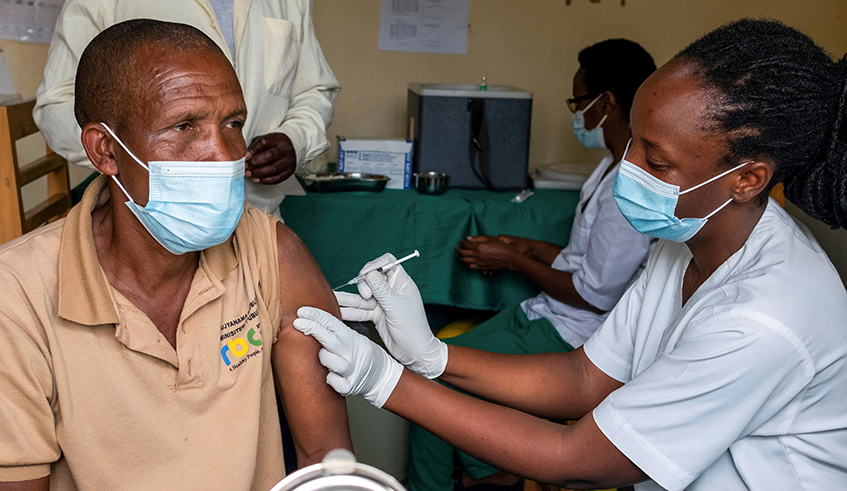

Last weekend, I joined the biggest crowd I have been in since the start of the first Covid-19 lockdown here in Rwanda 16 months ago.
The large gathering was not at a wedding, a church, a restaurant or a sports arena, which are all currently banned or closed because of Covid-19.
It was at a hospital. To be more precise, it was at Kibagabaga Hospital in north-east Kigali. And it was legally sanctioned (as long as everyone wore masks).
A close Rwandan friend and I had heard rumours that it was the last day for Pfizer vaccinations to be given out there and so we got up early on a cool Saturday morning, dressed a bit more formally than usual and arrived coffee-less at about 7.30 am to see if the stories were true.
When we found our way to the back of the complex, there were already about a hundred Rwandans of all ages and one South Asian man milling around and chatting outside in brightly colored ‘doctor-visit’ clothes, wondering, like us, what would happen next.
Suddenly, there was a big buzz of excitement and a bit of a scrum when a hospital employee with an ID necklace and yellow vest started giving out forms. My Kinyarwanda is not good enough to understand every word but seeing ‘Covid-19’ and ‘RBC’ (Rwanda Biomedical Centre) gave me hope that we would indeed receive our first vaccinations that morning.
Another hour passed and then we were asked to line up in two opposing rows of benches and chairs under the covered walkway. This was to try to ensure physical distancing but all efforts were abandoned for a moment when there was an initial scramble for any empty places. It was like a game of ‘medical musical chairs’.
My friend suggested that we carry our own bench in from the garden. "Are you sure?”, I asked, not wanting to appear to be the ‘ugly muzungu’. "Nta kibazo. Don’t worry,” she said, with a broad smile.
Growing up in England, one of the cardinal sins was to "jump the queue” and if you ever did, you would likely be greeted by loud sighs, audible grumbling, choice swear words and occasional ‘fisticuffs’.
I feared a similar sense of indignation here, especially given everyone’s clear anxiety and preoccupation with finally getting their first vaccine shot.
After a good start to the vaccination campaign in February and March, doses for first jabs all but dried up here in the Spring after India was forced to keep its own supply at home and the global Covax facility failed to deliver what it had promised.
In the meantime, Covid cases and deaths had been soaring in recent weeks, shooting up from 793 active cases and 364 deaths on 9 June to 15,325 and 507, respectively, on 8 July. As of 13 July, active cases had thankfully eased a little to 14,643 but deaths had risen further to 598.
To my very pleasant surprise, there was no evident anger at our ‘bench jumping’. Instead, we were greeted with smiling eyes, light teasing and ribald joking between everyone, especially when the line started moving and everyone had to jump to the next chair or bench to the left or right of them. One time we were too slow and the two of us had to squeeze uncomfortably onto the same narrow chair. Everyone around us howled with laughter.
After another hour, we finally reached the front of the line and then in quick succession, each of us was able to register at an outside table, receive our jabs, wait for 10 minutes (to see if there was any adverse reaction) and get on our way. We both felt a mixture of emotions: great relief at beginning the vaccination process; lingering guilt at now being part of a very small minority of lucky recipients; and a little bit of dull pain in our upper arms.
There was even some sadness to leave the hospital as the ‘medical musical chairs’ game had been so much fun and it was so nice and now so rare to spend a few hours as part of a larger community, brought together by disease and fear but united by a common purpose, communal goodwill and, most important of all, a strong sense of humour.
Maybe these are all things can give us some extra hope and solidarity in the many challenging times that still lie ahead?
"A sense of humour is the pole that adds balance to our steps as we walk the tightrope of life.” (Traditional Arabic proverb)
This is the seventh in a monthly series of personal columns, entitled "Letter from Kigali”. Each month, local resident and writer, Jeremy Solomons – who was born and educated in England of Jewish, Lebanese and Persian heritage and naturalized in the USA - shares a unique perspective on what is happening in Rwanda, Africa and the rest of the world.
The views expressed in this column are entirely those of the writer who can be reached at jeremy@jeremysolomons.com


